-
Posts
437 -
Joined
-
Last visited
Content Type
Profiles
Forums
Gallery
Events
Posts posted by blkbrdrydr
-
-
Anybody know of a source for Philips 4300K bulbs???
-
When I bought my HID kit, I ordered 5000K bulbs. Since then, I've always thought that the light was more blue than I wanted so I've begun to consider ordering a pair of 4300K bulbs.
There seems to be many suppliers that sell those on eBay but before I ordered any, I wanted to know if the ones that came with our McCullough HID kits had standard connections or if they were special.
Do all HID bulbs have the same connectors?
-
Get some 6pt sockets so that you'll always have nice looking nuts. :icon_thumbsup:
-
Here's a wealth of information about the vibration problem that seems all to common in our Blackbirds.
-
Question, how long does it take to ride 1000 miles????????
Well... if you can ride 200 miles at a time, here's one possible answer to your question.
Ride 200 miles @ 76 mph (you'll only be arrested and do serious jail time for that speed in Ohio)
At that speed, it will take 2 hours, 38 minutes to ride the 200 miles.
Exit the freeway, get to a gas station, get your gas, do whatever else you need to do and be back on the road doing 76 mph within a 22 minute window and you'll do 200 miles every three hours.
At that pace, it takes 15 hours to ride 1,000 miles.
-
The Honda pad looks great, but it doesn't protect the sides of the tank at all.
Protect the sides of the tank from what?
I wrote in my post that I'd looked closely at the locations of all of the scratches on the Mag-Knight bra, and after deciding that 99.99% of them were at the back of the tank it made sense to use the Honda pad. If you have scratches all over the sides of your tank, then use a Bagster.
-
I had always used a Mag-Knight tank bra on my XX but never really liked the way that it looked on the tank.
After looking closely at the locations of all of the scratches on that bra, and learning that 99.99% of them were right at the back of the tank... I decided to install a genuine Honda tank pad instead.
In the U.K. this pad carries part number 08P61-MCS-800 and is shown in the official Honda U.K. Accessories Catalog as an accessory tank pad for the CBR1100XX, ST1300, and a few other models.
In the United States the part number is 08P61-MCS-100 and the box says that it's an ST1300 part.
Bottom line is that it costs $41.07 from Service Honda and it fits the XX perfectly.
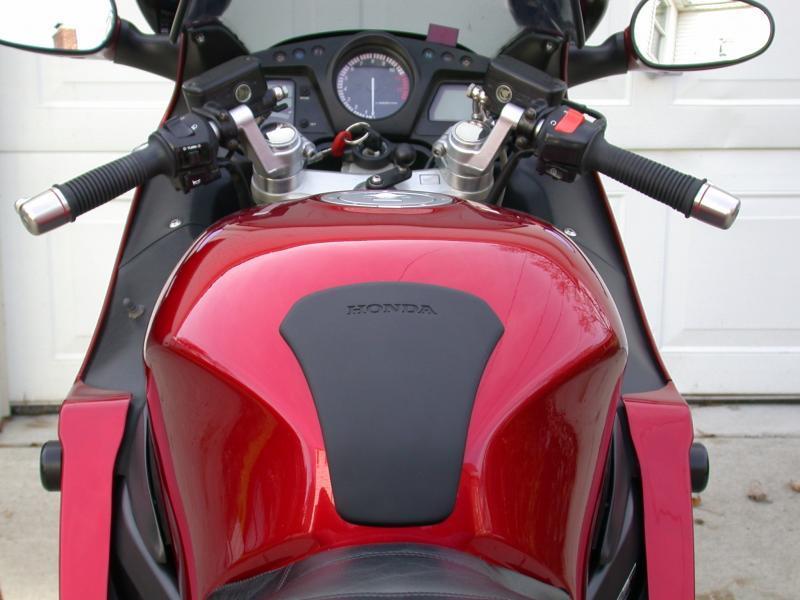
-
My FI light used to come on until I removed the PC II
-
As I recall, the height is closer to the OEM screen than to my Givi.
Additionally, you can put the windscreen into place without removing it from the shipping bag which will allow you to return it to twistedthrottle if you don't like it.
In my opinion, they look better in person than in any photos that I've seen but you'll know if you want it mounted on YOUR bike as soon as you see the real thing.
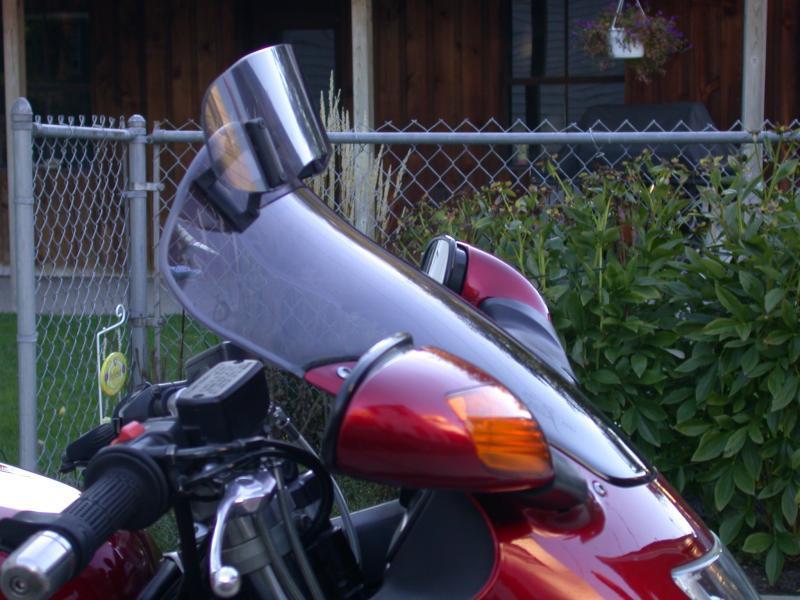
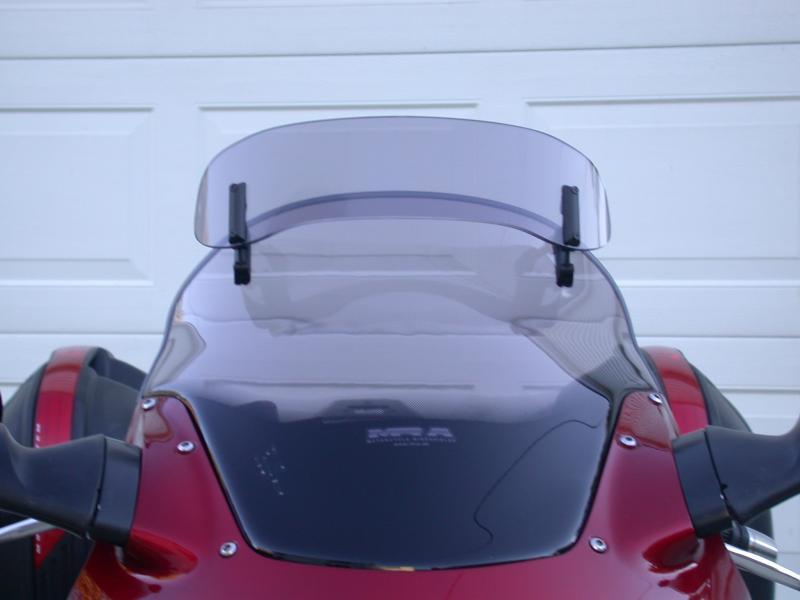
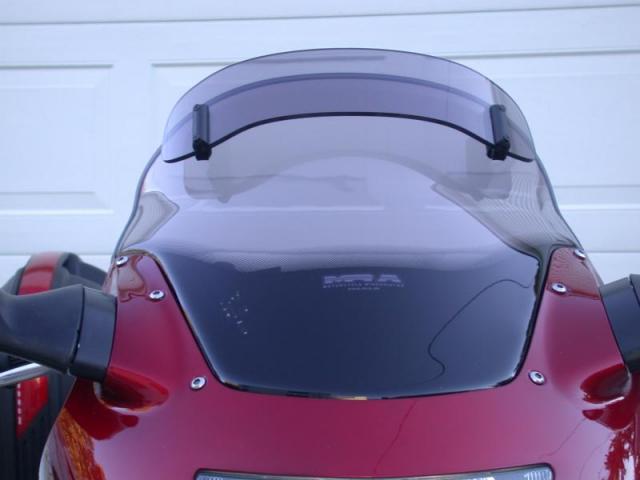
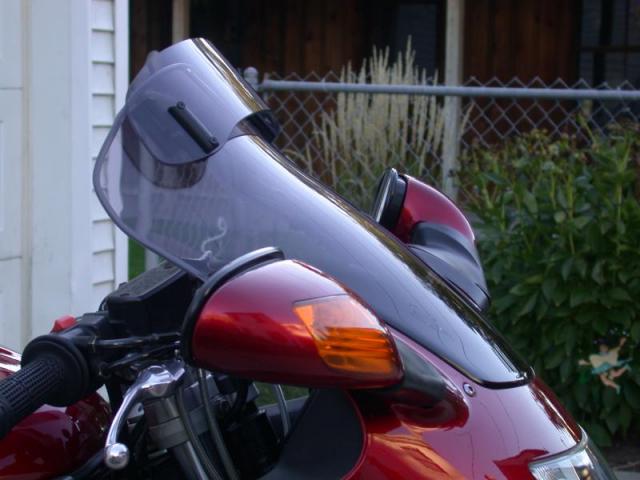
-
Here's some information regarding the VarioTouring Screen and a few photos.
At 70 mph, in the lowest position, the airflow hits my chest in approximately the same area as the OEM screen but the flow is far smoother. In the highest position, the airflow hits just above my visor and is also quite smooth. Ducking down slightly, eliminates almost any air from hitting my helmet at all.
Interestingly, there was almost no air hitting my shoulders and hardly any hitting my hands. I was riding on the freeways in 55 degree temps and my hands stayed warm wearing 3-season Olympia gloves.
I'm 5'9" but my Russell Day-Long saddle is probably an inch or so higher than the OEM seat.
It didn't turn the XX into a Goldwing but I'm happy with the results so far.
-
Anybody using any of these products? Baehr Products
-
I was changing my coolant today and used Honda coolant as I always do. While I was waiting for the engine to cool during the flushing process, I came across this information. It's a few years old and compares Honda brand to the ones that contained Silicates but using Brand X is what caused my Goldwing's water pump failure in 1997 so I found the article interesting.
-------------------------------------------------------------------------------------------------------------------------
Recently, several people have questioned whether the coolant (anti-freeze) sold by Honda and Acura dealers is different from the popular mass-market brands.
Honda has sent the information attached below to its dealers. While you might not expect the source to be exactly unbiased, it does provide technical information and justification for differences in their formula.
Genuine Honda Coolant is the Only Way to Go
Increasingly severe operating conditions and the advent of lower maintenance requirements have resulted in significant changes in the variety and the concentration of additives used in engine coolant. Also, the continual improvements in engine and vehicle design have challenged coolant suppliers to design products that perform well in a more demanding environment.
To meet these needs, Honda engineers have developed a superior, high-quality coolant that has several advantages over the competition.
Some antifreeze, although labeled as safe for aluminum parts, may not be compatible with Acura cooling system components. Extensive research and testing by both Honda R&D and CCI, the manufacturer of the Honda coolant, have proven that the abrasive silicates and/or borates found in most domestic coolants can cause these problems:
- - Silicates bond to the surface of the water pump seal and act as an abrasive, causing considerable seal erosion and coolant leakage. In actual tests, the silicated coolant caused early leakage. This leakage increased dramatically until a substantial portion of the coolant had been lost. In contrast, the Honda coolant had almost no leakage through the duration of the test.
Chart here, entitled "Coolant Leakage from Water Pump Seal", showing Leaked Coolant Volume in ml as follows for each test duration in Hours:
24 hrs: Honda Coolant 0, Typical Silicated Coolant 21
48 hrs: Honda Coolant 1, Typical Silicated Coolant 36
72 hrs: Honda Coolant 2, Typical Silicated Coolant 47
96 hrs: Honda Coolant 2, Typical Silicated Coolant 55
120 hrs: Honda Coolant 2.5, Typical Silicated Coolant 56
144 hrs: Honda Coolant 3.5, Typical Silicated Coolant 57
168 hrs: Honda Coolant 4, Typical Silicated Coolant 58.8
192 hrs: Honda Coolant 6, Typical Silicated Coolant 63
200 hrs: Honda Coolant 6, Typical Silicated Coolant 64
- - Silicates tend to gel and settle in the coolest parts of the cooling system, causing radiator plugging and overheating.
- - Borates cause pitting corrosion on the cylinder head.
- - Silicate inhibitors are difficult to stabilize and, therefore, limit coolant shelf life.
Most commercially available coolants were originally designed for cast iron engines. Silicate, an inexpensive additive, was added to coolants to prevent aluminum corrosion, but the long-term durability of the combination was not tested.
In contrast, Honda coolant was designed specifically for aluminum engines. It contains an organic corrosion inhibitor instead of silicate. This superior formula gives these advantages:
- - No silicate abrasion of water pump seals. For example, these graphs show the surface roughness of two aluminum water pump seal rings. Seal A, exposed to silicated coolant, shows considerable damage. Seal B, exposed to Honda coolant, displays only minute wear.
[graphs here, showing roughness across the surface, with A a very wiggly line, and B a very smooth line]
- - No plugging or overheating caused by silicate gelling.
- - Excellent corrosion protection for aluminum components.
- - Long-term corrosion protection for other cooling system materials (steel, cast iron, copper, solder, gaskets, seals, and O-rings).
You can find less expensive coolants on the market, but now you can see why genuine Honda coolant is the only coolant approved for Honda and Acura vehicles (it MUST be used for warranty repairs). Honda's non-silicate formula delivers added protection not offered by 95 percent of other brands. Since our customers expect lower maintenance, you're doing them an injustice if you use any other coolant.
-
1999 - 2001 Honda Service Manual sez............
place the motorcycle on its side stand
CHAIN SLACK: 25 - 35 mm (1.0 - 1.4 in)
I set mine closer to 1.75 in and with the Scottoiler, I hardly ever have to adjust it. (currently have 33,500 miles on the OEM sprockets and chain and not even close to replacement time)
-
Here is what VFR bars look like on top of GenMar risers. I do have braided steel lines that are longer than stock but the bars fit easily under the OEM windshield, a GIVI, or my current MRA.

-
It's Christmas Eve in Michigan and I just finished a 100 mile freeway ride in 35 degree temperatures. My hands stayed quite warm when wearing three-season gloves for the first 50 miles. On the return trip, I wore Gerbing's Heated Gloves and thought that my hands were in a toaster (even on the lowest setting).
GREAT PRODUCT!
-
Most chains are done at 25K miles, <> depending on rider. As others have posted, if you have to adjust it after every 200-400 mile ride, it's done. Oiling/cleaning seems to have little impact on chain life, regardless of what Scottoiler (and others) say. This applies to O-ring chains only. Sprocket life also depends on riding habits.
I'd like to match the 80,000 mile chain and sprocket life that this guy got on his XX

http://www.cbr1100xxforums.org/forum/viewt...+milage+mileage
-
99 xx 20k Fi
1. How often should the chain need adjusting, I did mine 2 weeks ago and after about 300 miles it needs done again, it is kept well oiled.
I agree that your chain may be worn out. I keep mine well oiled (Scottoiler) and hardly ever need to adjust it. Maybe every couple thousand miles or so. Chain currently has over 33,000 miles and less than 1/2 way through the green wear indicator.
-
Couldn't you also just use Honda part #31600-MAT-D51 from the 2001-2003 models? I think that part is around $90 from Service Honda. Or, isn't there anything to be gained from the extra $30 or so?
-
Being stylish just doesn't matter when it's cold and wet enough to be using these things.

-
Now that I've sold my Goldwing, I have made a few significant changes to the Blackbird to make it more comfortable for year-round riding. Although I use heated gloves and the MRA VarioTouringScreen does one hell of a job keeping most of the wind off my hands, I still wanted a little bit of extra warmth. On my old R75/5 BMW, I used a set of original Vetter Hippo Hands but they would have never fit over the controls of a modern motorcycle so I turned to Dan Klestorny who previously made my fork gaiters. He manufactures an updated version of the Hippo Hands that fit modern motorcycles.
I sent numerous closeup photos of my VFR bars and the controls as well various measurements to Dan. From that information, he determined that the measurements for my XX were very similar to the Kawasaki Concours so I was able to order that set for my bike. The quality is excellent and they fit my bike extremely well.
Here's the information on how they are constructed and a photo of them on a Connie since I'm too lazy to go out to the cold garage and photograph what they look like on my XX.
http://hippohands.com/Hippo%20Hands.htm

-
Have had Hyperpro springs in my 2001 for 17,000 miles and am still pleased. I use 5W fork oil rather than the recommended 2.5W because the ride is better for me.
-
In the past, I've had a Bagster, a Givi, and a RKA. Although I sort of liked all three, my preference is for this one which I bought on eBay for around $40.
-
For the 13 winters that I owned it, the mileage dropped off a few mpg on my Goldwing which had carbs. For the last three winters, the mileage also dropped off a few mpg on my XX which has FI.
YMMV
-
I saw a 3 to 5 degree increase of indicated temp switching to synthetic.
Synthetic increased the indicated temperature?
I would have guessed the opposite but I've used synthetic in my 01 for so long... I don't remember what the temps were back when I used Honda GN4 and I probably made the switch to synthetic in the fall or spring when the weather was cooler anyway so I wouldn't have noticed the difference.



~0.JPG)



HID Bulbs
in The Garage
Posted
So, a rebased Philips bulb is what I'm looking for?
I think that I found a seller of those on ebay yesterday. As I recall, the bulbs were around $110 each.